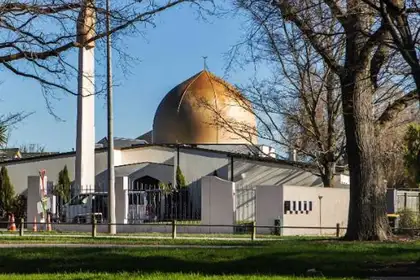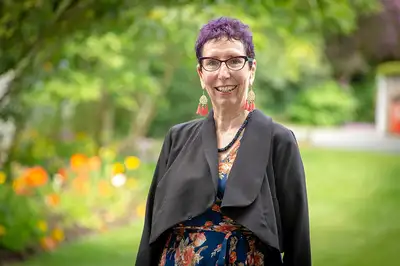
The Al Noor mosque in Christchurch, one of the scenes of the March 15 terror attacks.
Beyond collective grief and emotional reactions to the atrocities of March 15, Massey University academics with expertise in security will share their views how we might understand and respond to the terror attacks, in a lunchtime lecture series.
Dr Negar Partow offers her insights in tomorrow’s ‘Lunchtime learnings: Responses to terrorism in New Zealand’ in her talk, Empathy and human rights in difficult times. It is the first in a series that will continue in May and June.
Iranian-born Dr Partow is an expert on Middle East politics, religion, human rights and global security who teaches in the Centre for Defence and Security Studies. Born in Iran’s capital city, Tehran, Dr Partow lived there through the 1979 Islamic Revolution, which saw the overthrow of the Iranian monarchy and its replacement with an Islamic republic under Ayatollah Ruhollah Khomeini. She grew up there during the 1980 to 1988 Iran–Iraq War.
A regular media commentator on Middle East issues including energy supply, social and political unrest, human rights, gender equality issues, civil rights, religious diversity, globalisation and security, Dr Partow is also the founder of an International Women’s Day (March 8) event in New Zealand to encourage refugee and migrant women to practice bike-riding skills as a way to connect with others while having fun and getting fit.

Dr Germana Nicklin, Regional Director in Wellington for the College of Humanities and Social Sciences.
Societal issues brought to light by mosque attacks
Regional director for the College of Humanities and Social Sciences in Wellington Dr Germana Nicklin says many New Zealanders still struggle to make sense of the Christchurch attacks.
“For most of us, now over a month since those terrible attacks, life has returned largely to normal. And yet these are not normal times,” says Dr Nicklin. “Our feelings may still be raw. We may feel a need to understand and help prevent such an attack from happening again.
“This lunchtime series provides a space for people to reflect on, and gain deeper insights into, some of the societal issues brought to light by the attacks. Delivered by academics from Massey University in Wellington who are researching and teaching in a range of relevant areas, these talks draw on the latest research, covering human rights, social media, security and religion, self-care and counter-terrorism.”
The talks are from 12:15pm to 1pm at St Andrews on the Terrace, Wellington. Other topics are:
- Dr Kevin Veale: How social media companies profit from racism, abuse and harassment (14 May)
- Dr Wil Hoverd: Security and religious diversity (21 May)
- Dr Maureen Mooney: Self-care community care (28 May)
- Nicola MacAulay: Is banning the manifesto of the alleged gunman warranted? (11 June).
Security and religion symposium
This week, the Centre for Defence and Security Studies is also hosting a symposium on Security and Religion, which sets out to capture the experiences and challenges facing modern states when it comes to protecting its religious citizens in a secular nation.
Convenor Dr Wil Hoverd says the May 1 symposium at Massey’s Wellington campus will explore ideas about states and the dynamics of religious diversity, social cohesion, human rights and security. It will draw together experts from the study of religion, sociology, philosophy, international relations, and security to consider the question of how do we all live together safely?
The programme will not be directly discussing the Christchurch attacks, he says, but is intended to share a multidisciplinary field of academic thinking with the public. Massey’s academic presenters include Distinguished Professor Paul Spoonley (Hate speech: Preserving public security and wellbeing); Professor Rouben Azizian (Diplomacy, religion and security); symposium co-convenor Dr Negar Partow (Safety versus security: State narratives); Dr Wil Hoverd (Religious diversity: conceptual and practical challenges for Western nations); andmaster’s student Shahd El Matary (The integration of Muslim immigrants in New Zealand).
The symposium will include live global perspectives via online presentations by Professor Lene Kuhle (Aarhus, Denmark) – The State and Islam: A Scandinavian perspective; Associate Professor Matthew Sussex (Australian National University, Canberra) Religion, politics and identity: Challenges for national security policy makers; and Professor Lorne Dawson, (University of Waterloo, Canada) Radicalization: Insights from talking with Western jihadist fighters in Syria And Iraq.
The symposium runs from 8am-12.30pm on Wednesday 1 May, in Lecture Theatre 4B06 in Block 4, Gate A, Massey University, Wellington. To register, email cdss@massey.ac.nz